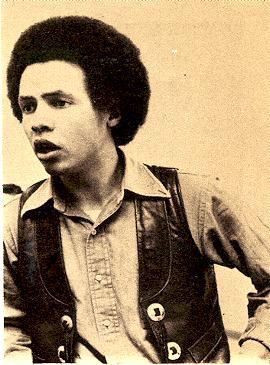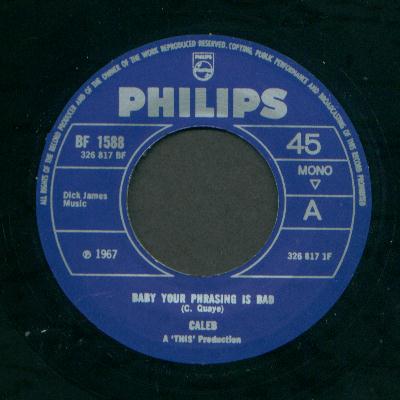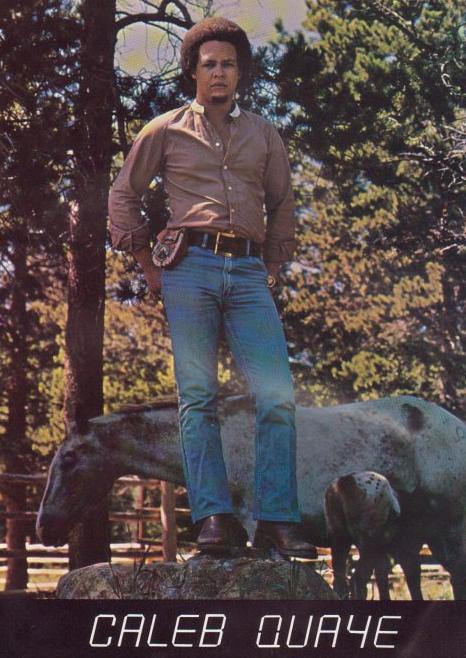|
Caleb
Quaye
|

|
Caleb Quaye(1948),
viene ricordato unicamente come chitarrista, ma sapeva suonare anche il
piano e la batteria. Essendo stato assunto in
qualità
di ingegnere del suono alla Dick
James Records,
collaborò
con Elton John sin dagli inizi, dandogli la possibilità di
registrare
demos nello studio di New Oxford Street, canzoni che però
non furono
mai pubblicate ufficialmente ed esistono sotto forma di acetati e
bootleg.
Alcune voci, che sembrerebbero prive di fondamento, lo davano come
produttore
di un presunto album precedente a Empty
Sky,
che doveva essere pubblicato dalla Philips,
e
contenente una dozzina di queste canzoni (conosciuto come Sergeant
Zippo). Il
bassista Rod "Boots"
Slade
ci
ha però confermato di aver suonato (oltre che dal vivo)
anche su
quello che doveva essere il primo album di Elton, ma non fece certo
parte
delle session per
Empty
Sky,
percui
il discorso resta aperto. Caleb, suonò
in un certo periodo
anche nei Bluesology
e formò successivamente
gli Hookfoot, primo
gruppo ad accompagnare
Elton dal vivo e alla BBC,
prima di Nigel
Olsson e Dee Murray.
Nel 1967 ha
pubblicato il suo unico disco, un singolo a nome Caleb,
contenente Baby Your
Phrasing Is Bade
Woman
Of Distinction
(PHILIPS)
e
tra i musicisti che parteciparono all'incisione vi potrebbe essere
anche
Elton. Il disco è quasi impossibile da trovare e
viene quotato
dalle 150 sterline in su e circa nel 2004 è apparsa una
ristampa, probabilmente bootleg, in 500 copie. Nel 1969
partecipò anche al progetto
Bread
and Beer Band. Ritornò a suonare con
Elton dal vivo e
su disco negli anni 1975/76 (Rock
Of The Westies,
Blue
Moves). In pratica concluse la sua carriera
suonando dal 1978
con Hall &
Oates, insieme a parte
della Elton John Band
(Passarelli e Pope),
per poi abbandonare la musica nel 1982, diventando pastore
evangelico.
Caleb era un chitarrista elettrico molto più incisivo
ripetto a
Davey
Johnstone, come è dimostrato dai dischi a cui
partecipa e anche
dal vivo il suo apporto era notevole. Senza ombra
di dubbio
resta un personaggio chiave nella prima parte della carriera di Elton e
probabilmente è la persona che potrebbe rivelare alcuni lati
oscuri
di quel periodo.
 |
Caleb
pastore evangelico
articolo da WESTSIDE
web site del 18.12.03
ELTON
JOHN'S GUITARIST SINGS SONGS OF
HOPE IN BEL-AIR
Guitarist Caleb Quaye knows
the price
of fame, it almost killed him when he was on the road touring with
stars
like Elton John and Hall and Oates during the 1970s.
Cocaine, booze, LSD, heroin,
pot, uppers,
downers, there was no one particular drug of choice.
"I just liked the whole lot,"
admits Caleb,
who played guitar on Elton John classic "Your Song."
"Some people are amazed I'm
still alive,"
he continues. "I had an old friend call me out of the blue recently,
and
he started crying into the phone. He had assumed I was dead."
Yet 25 years later, we find
Caleb happy,
healthy, and playing festive songs to a captivated audience at Bel Air
Presbyterian Church. On December 7, the 55-year-old performed in a
concert
organized at the church by SLATE, an organization working to promote
film
and the arts. The grand hilltop venue on Mulholland Drive seemed
befitting
for a man who has climbed so many mountains of his own.
"It was my first time at the
church,"
he says. "I don't think it's that often that they hear that style of
music.
We were just doing a lot of improv, throwing in loads of jazzy stuff.
Afterward,
I also talked to them about my life story."
And what a life story it is,
starting
in the 1960s when a teenage Caleb made friends with 15-year-old
Reginald
Dwight, who later changed his name to Elton John. Both were working as
office boys on Denmark Street, the heart of London's music publishing
industry.
"We started playing in bands
together,"
says Caleb. He was hilarious. We both liked the same kind of music, and
we developed a friendship. Then I got a job working for Dick James, the
Beatles' publisher. Dick built a studio and opened a label, and I
became
the A&R man and ran the studio."
Caleb was the one who got
Elton John and
his lyric writer, Bernie Taupin, their first record deal. He also
played
on and oversaw the recording of classic tracks like "Your Song," "Take
Me To The Pilot" and "Madman Across the Water." It was an amazing time
for all concerned.
"We were of that generation
that some
people called the seekers," says Caleb. "We were hippies coming into
the
seventies, and we were searching for something, searching in all the
wrong
places."
Caleb found each gig blurred
into the
next as he embarked on a series of high-pressure world tours with
different
artists, fueled by what he called a "pot-pourri" of drugs.
Things came to a head in 1978
on his 30th
birthday. He was on tour in Atlanta, and after yet another heavy night
of cocaine and marijuana, Caleb found himself alone in his hotel room.
"I was depressed," he says.
"Miserable.
Stoned out of my face. And then I heard a voice, and it told me that
from
that day forth, my life would never be the same. I heard it so clearly
I actually thought someone was in the room, but I was alone."
Caleb now believes that at
that moment
he was visited by God. He accepts that people who do not share his
strong
Christian faith may find that hard to believe. At first, even he
couldn't
make sense of what had happened that night. And when he told his
friends,
"all they wanted to know was what I'd been smoking and where they could
get some," he says.
It was another two years
before Caleb
decided to dedicate himself to the church as a result of what happened
that evening, and after a second "visitation." His newfound belief
helped
him purge the negative forces which had so nearly destroyed him. He
became
a minister, and threw out the drugs and the debauchery.
But he never let go of the
music?which
is what brought him to Bel Air Church on December 7. It has also taken
him to schools and colleges across California, both Christian and
secular,
where he has talked to young people about his experiences. He is also
providing
his half-brother Finlay Quaye (a young recording artist in the UK) with
spiritual guidance. The two met for the first time just two years ago,
and Finlay's own struggles eerily echo those of his half-brother. Caleb
is also still friends with Elton John, although he says the superstar
is
less enthusiastic about church matters than he is.
Whatever their faith, most
who hear Caleb's
story cannot fail to be inspired, both in the way he overcame addiction
and his role in creating some of the world's best-loved music.
"The root cause of taking
drugs is nearly
always to do with relationships," says Caleb, who lives in Los Angeles
with his three daughters. "It's about parents or authority, about times
in our lives when we should have experienced love, but we didn't. For
me
it was my father, he wasn't there for me as a child when I was growing
up. Those things leave a hole that only God can fill."

|
|